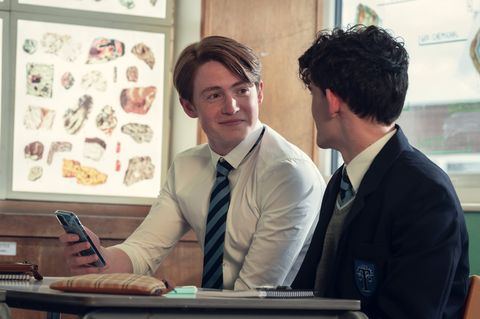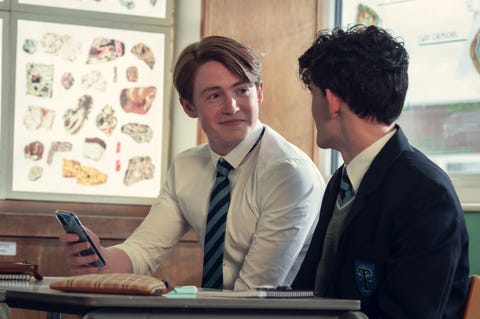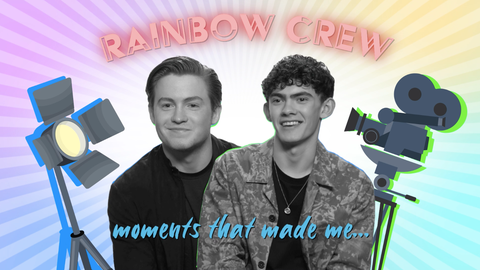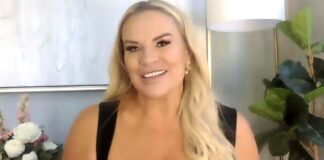When Netflix’s gay coming-of-age love story Heartstopper dropped on Netflix in April, it catapulted its cast of newcomers into the international spotlight just like the Stranger Things kids before them, with all of the scrutiny that entails. This was especially true of Kit Connor and Joe Locke, who play budding sweethearts Nick and Charlie, and it wasn’t long before speculation about their real-life personal lives began to spread online.
Specifically, a contingent of fans who were deeply invested in Nick and Charlie’s on-screen relationship began to question whether Nick, who is bisexual in the show, should be played by an actor who isn’t part of the LGBTQ+ community (Locke, like his character Charlie, is openly gay). This culminated in Connor making an announcement on social media on October 31, telling the world that he is, in fact, bisexual. The actor also reminded everybody that he is 18 years old, and that he felt pressured into disclosing this information due to the constant hounding he was receiving.
Connor’s castmates rallied around him following the tweet, and a large number of followers have also expressed their support for him while condemning the so-called fans who made him feel he had no choice but to come out before he was fully ready. Some have even pointed out that forcing Connor to come out as bisexual may have a detrimental effect on his future career just as it is beginning, because Hollywood’s cowardice when it comes to casting queer actors in leading roles isn’t going away overnight.
This forced outing marks a worrying trend, wherein consumers of queer media are demanding an increasing amount of transparency about artists’ private lives in order to “justify” their work. It’s not just entitled; it’s invasive.
There is a long-running disproportion in the entertainment industry, where openly gay or bisexual actors are not seen as viable leads in “straight” movies and are often passed up even for gay roles, which are given to straight actors are who are then applauded for their range. The principle here is that LGBTQ+ performers should not miss out on opportunities. However, that sentiment has been flattened and distorted by online discourse into something more accusatory: “why is Kit Connor playing a bisexual character if he’s straight?”
There was also talk of Connor “queerbaiting” the Heartstopper audience, a term that describes storytelling where LGBTQ+ fans are intentionally misled into believing that a queer relationship will occur without that ever actually being written into the content itself. Note that this phenomenon relates singularly to narrative storytelling, i.e. films, books, and TV shows. But suddenly, it seemed, queerbaiting was happening in reality, and Kit Connor was guilty of it.
While queerbaiting, a dearth of representation, and the minuscule number of openly LGBTQ+ actors in popular media are certainly all issues that affect how queer people are perceived in the wider world, what got lost in all of the noise here was another question: Famous or not, what does any one actor owe us? What does an 18-year-old boy owe to the community?
Coming out is a deeply personal decision that can take years to reach. It is also something that most of us do on multiple occasions throughout our adult lives; each time we meet new people, start a new job, or refer to a partner in passing conversation, we are essentially declaring to the world again who we are, and in many situations we will be required to judge our own level of safety before choosing to do so. For somebody as sensationally famous as Connor, that decision is no longer his to make.
Earlier this year, Lukas Gage was accused of that most cardinal of sins—being a straight actor taking LGTBQ+ roles—after playing a gay man in romantic comedy series Love, Victor and participating in the internet-breaking rimming scene in The White Lotus. He responded by pointing out on Twitter, rather eloquently: “You don’t know my alphabet.” When called upon to “enlighten” people, he simply said: “No.”
And honestly, good for him.
Greedy, entitled fandoms are nothing new, of course. It’s just that we’re used to seeing this kind of behavior from the cishet white guys who claim to love Star Wars while also frothing at the mouth in rage anytime a woman or Black person shows up in Star Wars. It’s easy to forget that the same kind of toxic, bossy antics can be perpetrated by members of the queer community, who will gladly claim possession of any piece of media (or, indeed, any famous person) they feel a connection to while oblivious to their own gatekeeping.
In some corners of the internet, the very word “queerbaiting” has been overused to the point of being meaningless: any male celebrity who posts a thirst trap to Instagram is apparently queerbaiting, because apparently any and all content is designed for the consumption of queer men, and no other demographic ever gets horny on main ever.
So we find ourselves in a catch-22. It will only get easier for young queer people to come out and live openly as their true selves if they are able to see examples of it already happening in the world around them, and that will be accelerated by more people doing so on the amplified stage of celebrity. But who makes it feel safe for those actors, singers and artists to come out?
We do. By not pushing, speculating, or demanding that they come out for our comfort.
I get it, I really do. Growing up queer is isolating. We become so accustomed to seeing ourselves only as the butt of jokes in media, or training ourselves to see queer content through the lens of metaphor, that when we finally encounter a canonically queer story, it can feel like a gift meant just for us. And it becomes easy to forget about anyone else’s feelings, anyone else’s struggle, but our own.
“Parasocial relationships” are almost as exhausted a concept as queerbaiting, but we truly need to chill out on the expectations we place on celebrities—especially the ones who are so young they’ve never even voted in a general election. And until we do, all any celebrity owes us when asked to comment on their private life is a resounding: “No.”
Philip Ellis is a freelance writer and journalist from the United Kingdom covering pop culture, relationships and LGBTQ+ issues. His work has appeared in GQ, Teen Vogue, Man Repeller and MTV.











